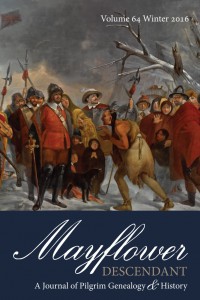 When the season turns to Thanksgiving, we often think of the first Pilgrims arriving on these shores aboard the Mayflower. And lately at NEHGS, when we think about the Mayflower, we think specifically of the Mayflower Descendant, of which NEHGS will be the steward for the next ten years. Christopher C. Child, Senior Genealogist of the Newbury Street Press at NEHGS, is the new editor, and busily at work on the first issue, due to mail to subscribers in January 2016. The first Descendant was published in 1899 by George Ernest Bowman, under the auspices of the Massachusetts Society of Mayflower Descendants, which continued to publish it until recently. Continue reading News of the Mayflower Descendant
When the season turns to Thanksgiving, we often think of the first Pilgrims arriving on these shores aboard the Mayflower. And lately at NEHGS, when we think about the Mayflower, we think specifically of the Mayflower Descendant, of which NEHGS will be the steward for the next ten years. Christopher C. Child, Senior Genealogist of the Newbury Street Press at NEHGS, is the new editor, and busily at work on the first issue, due to mail to subscribers in January 2016. The first Descendant was published in 1899 by George Ernest Bowman, under the auspices of the Massachusetts Society of Mayflower Descendants, which continued to publish it until recently. Continue reading News of the Mayflower Descendant
All posts by Leslie Ann Weston
The Experts’ Choice series
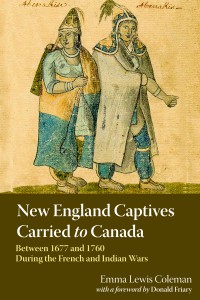 At first glance, the titles that comprise our Experts’ Choice series of books might seem a little randomly selected. We’ve got everything from collections of information on the earliest settlers of New England – Pioneers of Massachusetts, Pioneers of Maine and New Hampshire, and The First Puritan Settlers of Connecticut – to a guide book on the location and condition of Massachusetts public records in the nineteenth century, to an accounting of soldiers and officers who fought in King Philip’s War. All are tied by a common thread, however: these books are ones that NEHGS staff turn to over and over again when helping our members with their research. Continue reading The Experts’ Choice series
At first glance, the titles that comprise our Experts’ Choice series of books might seem a little randomly selected. We’ve got everything from collections of information on the earliest settlers of New England – Pioneers of Massachusetts, Pioneers of Maine and New Hampshire, and The First Puritan Settlers of Connecticut – to a guide book on the location and condition of Massachusetts public records in the nineteenth century, to an accounting of soldiers and officers who fought in King Philip’s War. All are tied by a common thread, however: these books are ones that NEHGS staff turn to over and over again when helping our members with their research. Continue reading The Experts’ Choice series
Researching your Irish ancestors
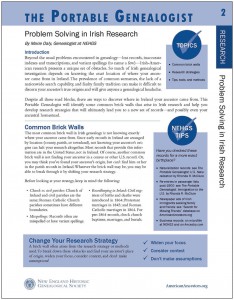 It’s St. Patrick’s Day! What better time to review NEHGS resources — both in print and online — that can help you research your Irish ancestors? Irish research offers particular challenges, largely owing to the destruction of many records in a 1922 fire at the Public Record Office in Dublin.
It’s St. Patrick’s Day! What better time to review NEHGS resources — both in print and online — that can help you research your Irish ancestors? Irish research offers particular challenges, largely owing to the destruction of many records in a 1922 fire at the Public Record Office in Dublin.
One great resource for getting you started is the Portable Genealogist Problem Solving in Irish Research, written by Marie E. Daly (who herself is a valuable NEHGS resource for Irish research). Marie notes that “the prevalence of common surnames, the lack of a nationwide search capability, and faulty family tradition can make it difficult to discern your ancestor’s true origins and will give anyone a genealogical headache.” To help readers, the guide identifies common brick walls that you might encounter and helps you identify research strategies. For instance, a little checklist notes records for determining a more exact birthplace. The guide also addresses some common assumptions that prevent researchers from moving forward with their Irish research. Continue reading Researching your Irish ancestors
Moving to (and through) New York
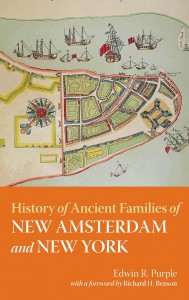 Building on previous posts, which featured books that help with researching ancestors who arrived first in Massachusetts and then moved westward or northward, this entry will look at some resources available to researchers whose ancestors moved to or first arrived in New York. As Henry B. Hoff, Editor of The New England Historical and Genealogical Register, notes in his introduction to the AmericanAncestors.org Research Guide on New York, “Finding information about your New York ancestors can be tricky. The difficulty depends on time, place, and group. Researching Dutch-descended New Yorkers in the Hudson Valley during the eighteenth century is likely to be easy; whereas researching settlers from New England in the same locale may be difficult. And of course the 1911 fire at the State Library in Albany and the fact that statewide registration of vital records did not start until 1880 only adds to the difficulty.” Continue reading Moving to (and through) New York
Building on previous posts, which featured books that help with researching ancestors who arrived first in Massachusetts and then moved westward or northward, this entry will look at some resources available to researchers whose ancestors moved to or first arrived in New York. As Henry B. Hoff, Editor of The New England Historical and Genealogical Register, notes in his introduction to the AmericanAncestors.org Research Guide on New York, “Finding information about your New York ancestors can be tricky. The difficulty depends on time, place, and group. Researching Dutch-descended New Yorkers in the Hudson Valley during the eighteenth century is likely to be easy; whereas researching settlers from New England in the same locale may be difficult. And of course the 1911 fire at the State Library in Albany and the fact that statewide registration of vital records did not start until 1880 only adds to the difficulty.” Continue reading Moving to (and through) New York
Heading north
 In my previous post, we took a look at some of the resources available for researching ancestors who moved beyond Massachusetts, with a focus on westward movement. Many also headed northward to current-day New Hampshire and Maine, although the area – as the frontier of English colonization and under threat of attack from the French and Indians – was not settled as quickly or densely as Massachusetts during the seventeenth century. According to NEHGS Trustee David Watson Kruger, Pioneers of Maine and New Hampshire, 1623–1660 by Charles Henry Pope is an “important primer on early Maine and New Hampshire families.” Continue reading Heading north
In my previous post, we took a look at some of the resources available for researching ancestors who moved beyond Massachusetts, with a focus on westward movement. Many also headed northward to current-day New Hampshire and Maine, although the area – as the frontier of English colonization and under threat of attack from the French and Indians – was not settled as quickly or densely as Massachusetts during the seventeenth century. According to NEHGS Trustee David Watson Kruger, Pioneers of Maine and New Hampshire, 1623–1660 by Charles Henry Pope is an “important primer on early Maine and New Hampshire families.” Continue reading Heading north
Successive generations moving west
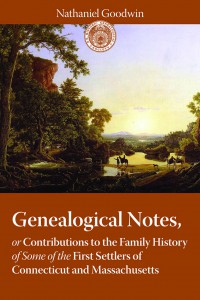 As the first settlements in seventeenth-century Massachusetts colonies became more established, and as various reasons for becoming restless or disenchanted within them developed, people began their forays beyond the known. In Genealogical Notes: First Settlers of Connecticut and Massachusetts, Nathaniel Goodwin covers families in such Massachusetts towns as Cambridge, Concord, Lynn, and Northampton and such early Connecticut towns as Windsor, Wethersfield, Simsbury, and Hartford. Continue reading Successive generations moving west
As the first settlements in seventeenth-century Massachusetts colonies became more established, and as various reasons for becoming restless or disenchanted within them developed, people began their forays beyond the known. In Genealogical Notes: First Settlers of Connecticut and Massachusetts, Nathaniel Goodwin covers families in such Massachusetts towns as Cambridge, Concord, Lynn, and Northampton and such early Connecticut towns as Windsor, Wethersfield, Simsbury, and Hartford. Continue reading Successive generations moving west
Great Migration resources
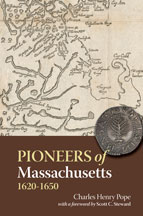 On Wednesday, we took a look at the books that are part of the Great Migration Study Project, which are key resources for genealogists and for people researching their own early New England ancestors. Just where did Robert Charles Anderson find the data to undertake his massive project? NEHGS Editor-in-Chief Scott C. Steward notes that Anderson “mined earlier published and unpublished compilations for lists of immigrants to New England, tirelessly cross-checking them against the surviving colony, county, town, church, probate, and deed record to create living portraits of seventeenth-century New Englanders.” Continue reading Great Migration resources
On Wednesday, we took a look at the books that are part of the Great Migration Study Project, which are key resources for genealogists and for people researching their own early New England ancestors. Just where did Robert Charles Anderson find the data to undertake his massive project? NEHGS Editor-in-Chief Scott C. Steward notes that Anderson “mined earlier published and unpublished compilations for lists of immigrants to New England, tirelessly cross-checking them against the surviving colony, county, town, church, probate, and deed record to create living portraits of seventeenth-century New Englanders.” Continue reading Great Migration resources
Thanksgiving, a history we all share
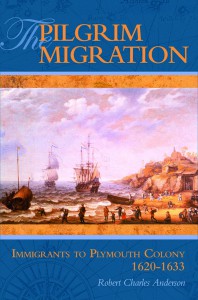 Thanksgiving is a holiday that prompts many of us to imagine, based on the history we’ve learned from childhood, what it was really like at the first Thanksgiving in 1621. It’s a story all Americans share, regardless of whether our ancestors were already living here in 1620, were among those who arrived on the Mayflower, or were counted as part of the multitude that followed in the coming decades and centuries, for Plymouth Colony set the stage for the America in which we now live. Continue reading Thanksgiving, a history we all share
Thanksgiving is a holiday that prompts many of us to imagine, based on the history we’ve learned from childhood, what it was really like at the first Thanksgiving in 1621. It’s a story all Americans share, regardless of whether our ancestors were already living here in 1620, were among those who arrived on the Mayflower, or were counted as part of the multitude that followed in the coming decades and centuries, for Plymouth Colony set the stage for the America in which we now live. Continue reading Thanksgiving, a history we all share
A night of staff research

Since coming to work at NEHGS, I’ve been surprised by how often people tell me about their own genealogical research when they learn where I work. They usually tell me I’m so lucky to be working here, and say how they would love to work at such a place. I expect part of this sentiment is due to the belief that we have plenty of time to take advantage of the tremendous resources we have access to, but as passionate as most staff are about genealogy, their own research has to wait until the end of the work day, at which point the demands of life may also prevent people from getting to their research. Continue reading A night of staff research
Notes on a Wolf family reunion
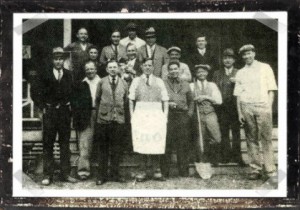
I arrived last fall at the New England Historic Genealogical Society as a neophyte in family research and I still consider myself one. My position as NEHGS Publications Coordinator, however, has given me some insight into which publications are go-to resources for genealogists and family researchers, and I’m now familiar with translating findings into Register style and the ahnentafel format. I’ve also heard many interesting stories related to unexpected findings and brick wall breakthroughs, particularly when talking with participants in our Writing & Publishing Seminar this past May. Continue reading Notes on a Wolf family reunion